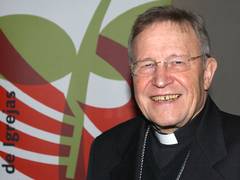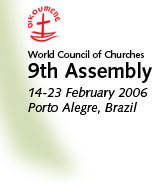 |
WCC > Home > News & media > Features | ||||
| About the assembly | Programme | Theme & issues | News & media | |||||
 |
|
||||
|
16.11.05
Challenged to open our eyes and to bear witness "The theme of the World Council of Churches' 9th Assembly God, in your grace, transform the world, is a profound prayer of faith and hope in God."  "... to bring good news to the poor... to set the downtrodden free and the proclaim the lord's year of favour" As part of its social work, the Christian Evangelical Church in Minahasa helps people who make a living garbage heaps. Indonesia, 2004  "...a covenant relationship between God and human beings, and between God and the whole of creation" Cardinal Walter Kasper, president of the Pontifical Council for Promoting Christian Unity, contributes in the following article a reflection from the perspective of the Roman Catholic Church on the theme of the upcoming World Council of Churches 9th Assembly: God, in your grace, transform the world. The theme of the World Council of Churches' (WCC) 9th Assembly God, in your grace, transform the world, is a profound prayer of faith and hope in God, who gratuitously and continually leads the Christian to personal renewal and conversion, and uses the church as an instrument of his love in transforming the world. In two of the proposed biblical readings on the theme (Luke 4 and Isaiah 61), one finds the theological foundation for God's action through the church as "the indivisible sacrament of salvation". [1] God's transforming work is brought about through Christ, who "having been lifted up from the earth, is drawing all men to himself" (John 12:32 Greek text). Having risen from the dead (cf. Rom 6:9), he sent his life-giving Spirit upon his disciples and through this Spirit has established his body, the church, as the universal sacrament of salvation." [2]. In the text from Isaiah 61:1-4, fulfilled in Luke 4:16-30, it is clear that "the restoration which we are awaiting has already begun in Christ, is carried forward in the mission of the Holy Spirit, and through him continues in the church". [3] Through Christ's presence in the action of the Holy Spirit, God is continually active in the world transforming humanity, and the entire cosmos. The Second Vatican Council understands the church as "the universal sacrament of salvation", [4] that through God's grace has the dual task of working for the realization of its own full unity and for the unity of fragmented humanity. Thus the Council sets the church in perspective by focusing on its eschatological nature as the pilgrim people on the way towards the final realization of God's kingdom, when the human race as well as all of creation, which is intimately related to human beings and achieves its purpose through them, will be perfectly re-established in Christ. [5] The foundation of the church's role in the world is theological and christological. In the Old Testament, God's intervention in history is perceived against the background of God being the creator and lord of all things (cf. Isa 40:21-26; 42:5f). In the Old Testament, the realization of messianic righteousness (God's rule) was always linked to the restoration of order in the whole cosmos - the whole inhabited earth (oikoumene). In the New Testament, especially with Paul, sovereignty is attributed to Christ who is the head of the church (cf. Eph. 1:18-20), and of all things (cf. Eph. 1:22; Col. 1:15-18; 2:10). Christ, as head of both domains, is the bearer of a covenant relationship between God and human beings, and between God and the whole of creation. The theme of the WCC Assembly, God, in your grace, transform the world, presupposes faith and hope in God, who in Christ through the work of the Holy Spirit, has already fulfilled the promise. The end of ages has already begun, for the foundation of the restoration of all things has been laid in Christ. We not only pray and wait for God to transform the world. Christians are given the talents and wisdom to cooperate in God's work of transforming the world. In other words, Christians have the duty and responsibility to establish a world order in conformity to God's gift of truth and grace received in Christ Jesus our Lord. [6] Listening to the word of God in fresh ways The question that needs to be kept in mind regarding the theme is the following: What is God's purpose in creation, the mystery of salvation and the incarnation, a purpose that finds its culmination in the paschal mystery of Christ, who is finally lifted up in order to draw all things to himself (cf. John 12:32 )? The Second Vatican Council sums up the answer to this question in the following words: "While helping the world and receiving many benefits from it, the Church has a single intention: that God's kingdom may come, and that the salvation of the whole human race may come to pass. For every benefit which the People of God during its earthly pilgrimage can offer to the human family stems from the fact that the Church is 'the universal sacrament of salvation', simultaneously manifesting and exercising the mystery of God's love for man." [7] But concretely, how does the church live its pastoral ministry in the light of God's purpose of salvation? Christ's pastoral ministry, as set before us in Luke 4:16-30, is the model for the pastoral ministry of his church. Just as Jesus is sent by the father in the action of the Holy Spirit "to bring the good news to the poor, to proclaim liberty to captives and to the blind new sight, to set the downtrodden free and to proclaim the lord's year of favour", so too the church is sent to do no less, in order to contribute towards the realization of the messianic righteousness in concrete situations. The WCC Assembly theme challenges all Christians to listen to the word of God in fresh ways, so that they may capture what the word means in their lives today. Indeed, we are challenged to open our eyes, in order to see to it that the poor experience the good news, that captives are set free and that the blind of all categories are enabled to see again. We are challenged to bear witness to the transforming works of God through the Holy Spirit in our midst today, just as Jesus told the disciples of John, "Go and tell John what you hear and see: the blind receive their sight, the lame walk, the lepers are cleansed, the deaf hear, the dead are raised, and the poor have the good news brought to them" (Matt. 11:4-5). Therefore, the theme of the Assembly is both a prayer and a fulfillment of the kingdom of God in Christ through the instrumentality of the church sustained and guided by the Holy Spirit down the centuries. Cardinal Walter Kasper is, as president of the Pontifical Council for Promoting Christian Unity, the Vatican's top ecumenical officer. As a theologian he has written many articles and several books, including That they may all be one, the call to unity today (2004). He was a member of the WCC Commission on Faith and Order between 1975 and 1991. Notes: |
|||
|
|
|

